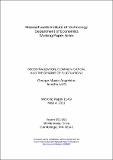Decentralizatiohn, Communication, and the Origins of Fluctuations
Author(s)
Angeletos, George-Marios; La'O, Jennifer
DownloadMarios11-09.pdf (596.9Kb)
Terms of use
Metadata
Show full item recordAbstract
We consider a class of convex, competitive, neoclassical economies in which agents are rational; the equilibrium is unique; there is no room for randomization devices; and there are no shocks to preferences, technologies, endowments, or other fundamentals. In short, we rule out every known source of macroeconomic volatility. And yet, we show that these economies can be ridden with large and persistent fluctuations in equilibrium allocations and prices. These fluctuations emerge because decentralized trading impedes communication and, in so doing, opens the door to self-fulfilling beliefs despite the uniqueness of the equilibrium. In line with Keynesian thinking, these fluctuations may be attributed to “coordination failures” and “animal spirits”. They may also take the form of “fads”, or waves of optimism and pessimism that spread in the population like contagious diseases. Yet, these ostensibly pathological phenomena emerge at the heart of the neoclassical paradigm and require neither a deviation from rationality, nor multiple equilibria, nor even a divergence between private and social motives.
Date issued
2011-05-04Publisher
Cambridge, MA: Department of Economics, Massachusetts Institute of Technology
Series/Report no.
Working paper, Massachusetts Institute of Technology, Dept. of Economics;11-09
Keywords
Business Cycles, Shocks, Dispersed Information, Stabilization Policy, Animal Spirits, Market Psychology, Higher-Order Beliefs
Collections
The following license files are associated with this item: